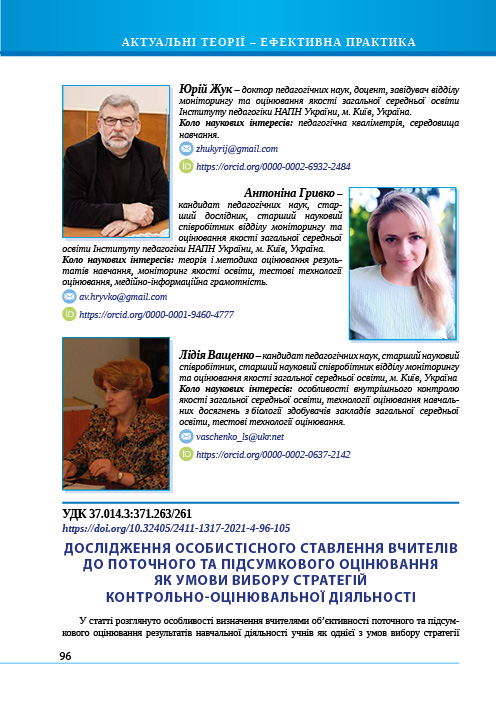Abstract
The article considers the peculiarities of teachers’ determination of the objectivity of the current and final assessment of the learning outcomes of secondary school students as the condition for choosing the strategy evaluation and control activities. Based on results of questionnaire data (N = 103) with using statistical methods of analysis (calculation of the concordance coefficient, cluster analysis, etc.), authors generalized the value of objectivity of reflection of knowledge, skills, competencies, attitude to the subject in the current and final assessments for different groups of respondents, as well as models of the structure of mental images of terms current assessment and final assessment, which were developed by teachers with different work experience. It was found that the level of objectivity of each of the assessed learning outcomes is higher in the final assessment. At the same time, as teachers’ pedagogical experience increases, so does the importance they give to the objectivity of all analyzed learning outcomes assessment. Comparison of the teachers’ survey results with the results of the study, which compared the documented final (annual) and actual assessments (according to students’ and teachers’ survey, N=90), showed differences between teachers’ perceptions (as it should be) and the factual state of affairs
(as it is) – less than third respondents are convinced that the annual final assessment is completely true.
The results of the cluster analysis revealed that the respondents understand the final assessment as a complex indicator of academic achievement, and the current – as an indicator of individual, albeit related, learning outcomes. The comparison of the constructed models allowed to generalize that, according to the respondents, the level of objectivity of abilities and skills assessment determines the objectivity of the assessment of acquired knowledge (readiness to apply them) and the formation of competence (meaningful application of knowledge).
Further research may be concerned with examining how teachers use the results of ongoing assessment to make decisions about further learning strategies in terms of competency-based learning.
References
Болюбаш, Я.Я., Булах, І.Є., Мруга, М.Р., Філончук, І.В. (2007). Педагогічне оцінювання і тестування. Правила, стандарти, відповідальність. Майстер-клас, К., 272 с.
Голубева, Э. А. (1993). Способности и индивидуальность. Прометей, М., 306 с.
Гривко, А.В., Ващенко, Л.С. (2021). Поточне та формувальне оцінювання в базовій та старшій профільній школі. Український педагогічний журнал, 2, 72–83. DOI: 10.32405/2411–1317–2021–2–72–83
Зыков, В. И. (1971). Познавательная деятельность учащихся со стойкой неуспеваемостьюв условиях работы экспериментальных классов. Психологические проблемы неуспеваемости школьников. Педагогика, М., 206–252.
Ляшенко, О.І., Лукіна, Т.О., Жук, Ю.О., Ващенко, Л.С., Науменко, С.О., Гривко, А.В. (2014). Тестові технології оцінювання ключових і предметних компетентностей учнів основної і старшої школи. Монографія. Педагогічна думка, К., 200 с.
Ляшенко, О.І., Жук, Ю.О., Ващенко, Л.С., Гривко, А.В., Науменко, С.О. (2017). Тестові технології оцінювання компетентностей учнів. Посібник. Видавничий дім «Сам», К., 128 с.
Перовский, Е. И. (1960). Проверка знаний учащихся в средней школе. Акад. пед. наук РСФСР, М., 510 с.
Петренко, В. Ф. (1986). Семантический анализ профессиональных стереотипов. Вопр. психологии, 3, 133–143.
Реан, А. А. (1994). Психология педагогической деятельности. Удмурд. ун-т, Ижевск, 93 с.
Gomez, M. (2017). Teachers’ Assessment and grading Practices in upper secondary Science Classrooms in Sweden: The Teachers’ and Students’ Perspectives. Lund University. 170 p.
Deneen, C.C., Fulmer, G.W., Brown, G.T.L., Tan, K., Leong, W.S., Tay, H.Y. (2019). Value, practice and proficiency: Teachers’ complex relationship with assessment for learning. Teaching and Teacher Education, 80, 39–47.
Lange, T. M. (2014). Interim assessment data: a case study on modifying instruction based on benchmark feedback: A Dissertation. Liberty University, Lynchburg, Virginia, 126 р.
Pellegrino, J., Chudowsky, N., & Glaser, R. (2001). Knowing What Students Know: The Science and Design of Educational Assessment. Washington, DC: NATIONAL ACADEMY PRESS, 379 p.
Bolyubash, Ya. Ya., Bulax, I. Ye., Mruga, M. R., Filonchuk, I. V. (2007). Pedagogical assessment and testing. Rules, standards, responsibilities. Majster-klas, К., 272 с.
Gomez, M. (2017). Teachers’ Assessment and grading Practices in upper secondary Science Classrooms in Sweden: The Teachers’ and Students’ Perspectives. Lund University. 170 p.
Deneen, C.C., Fulmer, G.W., Brown, G.T.L., Tan, K., Leong, W.S., Tay, H.Y. (2019). Value, practice and proficiency: Teachers’ complex relationship with assessment for learning. Teaching and Teacher Education, 80, 39–47.
Golubeva, E. A. (1993). Abilities and personality. Prometej, М., 306 с.
Hryvko, A. V., Vashhenko, L. S. (2021). Current and formative assessment in basic and senior profile school. Ukrainian pedagogical journal, 2, 72–83. DOI: 10.32405/2411–1317–2021–2–72–83
Lange, T. M. (2014). Interim assessment data: a case study on modifying instruction based on benchmark feedback: A Dissertation. Liberty University, Lynchburg, Virginia, 126 р.
Lyashenko, O. I., Lukina, T. O., Zhuk, Yu. O., Vashhenko, L. S., Naumenko, S. O., Hryvko, A. V. (2014). Test technologies for assessing the key and subject competencies of primary and secondary school students. Monograph. Pedagogichna dumka, К., 200 с.
Lyashenko, O. I., Zhuk, Yu. O., Vashhenko, L. S., Hryvko, A. V., Naumenko, S. O. (2017). Test technologies for assessing student competencies. Manual. Vy`davny`chy`j dim «Sam», К., 128 с.
Pellegrino, J., Chudowsky, N., & Glaser, R. (2001). Knowing What Students Know: The Science and Design of Educational Assessment. Washington, DC: NATIONAL ACADEMY PRESS, 379 p.
Perovskij, E. I. (1960). Testing the knowledge of students in high school. Akad. ped. nauk RSFSR, М., 510 с.
Petrenko, V. F. (1986). Semantic analysis of professional stereotypes. Voprosy psihologii, 3, 133–143.
Rean, A. A. (1994). Psychology of pedagogical activity. Udmurd. un-t, Izhevsk, 93 с.
Zykov, V. I. (1971). Cognitive activity of students with persistent academic failure in the conditions of the experimental classes. Psychological problems of schoolchildren’s academic failure. Pedagogika, М., 206–252.

This work is licensed under a Creative Commons Attribution-NonCommercial-ShareAlike 4.0 International License.
Copyright (c) 2021 Юрій Жук, Антоніна Гривко, Лідія Ващенко

